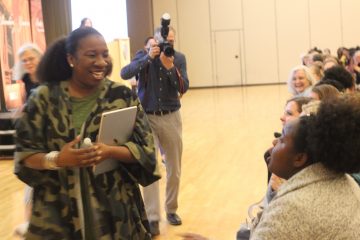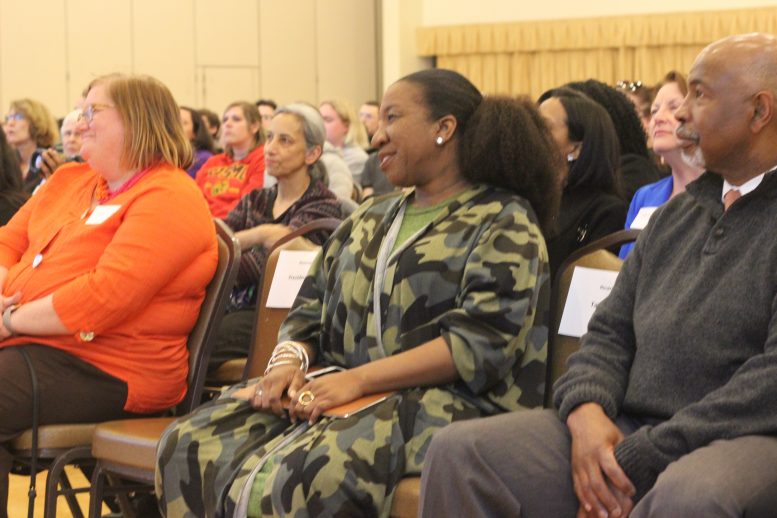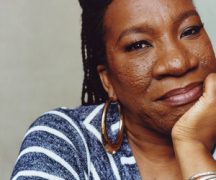By DAVID DUPONT
BG Independent News
Tarana Burke doesn’t want to be a celebrity. She doesn’t want to be the face of the Me Too movement five years from now.
Looking out at the audience that packed the ballroom in the Bowen-Thompson Student Union, she said she wanted someone young, with fresh energy and better ideas, some “bright unicorn,” to step up and lead.
Maybe that person will be the young aspiring social worker, whom she’d met earlier in the day during her visit to Bowling Green State University.
Burke, who launched Me Too in 2006 to combat sexual violence by supporting survivors and building a community of advocates, spoke at BGSU as part of the Ordinary People, Extraordinary Stories series hosted by the University Libraries.

Burke took the name of the series to heart. “This is a movement made up of every day people, ordinary people, who can do extraordinary things. I hope I’m proof of that and, if not, I’m trying to be.”
But she doesn’t want to toasted and honored. “Don’t celebrate me if you’re not going to stand up for what I believe in,” Burke said. “I have no use for celebrities.”
In one 24-hour period back in October, 15 million people used the hashtag #metoo. Those hashtags are people, people raising their hands to be heard. Most still have their hands up, said Burke, who is herself a survivor of sexual violence she suffered as a 6-year-old.
Unlike Black Lives Matter, which was responding to images of people being shot and choked in the street, Me Too survivors are not as visible. “We don’t have that sense of urgency because people can’t see our wounds,” she said. “They don’t realize what it is to be a survivor, to hold this deadness inside of us, looking for a place to put it. We’re literally the walking wounded.
“Those millions of people who raised their hands still are counting on us. Hell, they are us. We have to have urgency in this moment because I don’t know how long it will last.”
People need to take action. For some that will be working in a rape crisis center, or as a counselor.
For others it may be writing a check to the rape crisis center. Maybe it’s acting to insure children are safe when they go to school by making sure everyone students come in contact with are vetted.
Maybe for men, it is having a difficult conversation with other males who seek to dismiss Me Too as wanting to do away with due process.
“That’s not what it’s about,” Burke said.
Maybe it’s holding those in power up to being accountable. That holds true not just for the accused predators like Harvey Weinstein and R Kelly, but “the good guys” like Joe Biden.
Biden, she said, is not “a sexual predator.”
After his questionable handling of Anita Hill’s charges against then Supreme Court nominee Clarence Thomas, he’s done much good as a legislator.
But his behavior of approaching women from behind, smelling their hair and kissing them without their consent, is “creepy,” Burke said.
“If we can’t tell the best guy in the room your behavior makes me uncomfortable, and to change his behavior and be an example to other guys, what the hell are we going to do?”
These “good guys” need to acknowledge the effects of their action.
The same holds true for Supreme Court Justice Brett Kavanaugh, whose confirmation she admitted she opposed.
How different would it have been if he’d admitted he drank to excess as a 17 year old, and that while he didn’t remember the details of Christine Blausey Ford’s accusations, that it was something he may have done? Kavanaugh could have added that he’s spent 40 years “trying to be a better person, and I want to be accountable for the harm I caused you in that room.”
The media moving on from one accusation to another is just a game of “whack-a-mole,” Burke said. “We have to understand that calling out or taking down one of these bad actors is not going to undo systemic violence,” she said in reference to Weinstein and R Kelly.
“We have to talk about unchecked accumulation of power … and a misuse of privilege,” she said. Privilege is not evil, but it needs to be channeled into doing good.
“Our work centers on survivors,” she said, “especially survivors of color and the most marginalized among us including queer and trans folks. Our work is guiding people to individual healing.”
No one person heals the same way, she said, “There are so many pathways to healing. You all need different things. It’s a lifelong pathway.”
Burke urged the audience to go beyond the current hype, and look at all victims, black girls, indigenous women who suffer the highest rates of sexual violence, and children.
Me Too also promotes community healing. Everyone has a say in shaping the laws, policies and culture that protects against sexual violence.
“This is your community,” she said. “You deserve safety on this campus.”
While Burke praised the tenor of BGSU’s recently adopted strategic goals, she called on the administration — President Rodney Rogers and Provost Joe Whitehead who were sitting in the front row—to be explicit in how “your work to correct sexual violence on this campus fits into those strategic objectives. … There should be an inherent commitment to making this community less vulnerable to sexual violence.”
Student success should also include their “emotional and mental well being,” she said.
(Ed. note: Several days later in reporting to the university’s Board of Trustees, Rogers mentioned Burke’s speech and said the administration was considering her suggestions.)
“Students feel empowered when they feel safe. You have to prioritize their safety.”
As a parent of a college junior, she said, she looks for the emails from public safety on her daughter’s campus.
And when discussing their work they should be open about failures as well as successes.
Burke urged students to be part of that solution. “If you’re not happy with your experience on campus, you need to speak up.”
She said one way of doing that is to arrange a meeting of “the whitest of the white sororities” and the Black Student Union, not for a feel-good singing of “Kumbaya,” but to talk about “their lived experience on this campus.”
Burke continued: “I guarantee that you will have so many similarities. Nobody expects you to talk together, and then you need to organize together.”
Sexual violence, she said, does not discriminate
The administration needs, and wants, to know how safe or unsafe students feel on campus.
“It’s only good for a school that prioritizes safety.”
In addressing the problem of sexual violence, she said, “there is no silver bullet.”
That’s why she pushes back against the media hype and her designation as “the Me Too lady.”
She doesn’t have all the answers, and when she doesn’t have the answer she doesn’t want that to be the reason the problem is dismissed.
“If you look for validation in the media you will never find it,” Burke said.
The people who responded to #metoo people are still waiting. “They don’t care who Joe Biden is hugging. They want laws to change. They want culture to change. They want a place to find healing and wholeness. We can do that,” she said.
Raising awareness is not enough, she said. “This is our moral imperative. Let’s work together. Let’s heal together and if y’all are ready to do that I can only leave you with two words, ‘me too.’”


